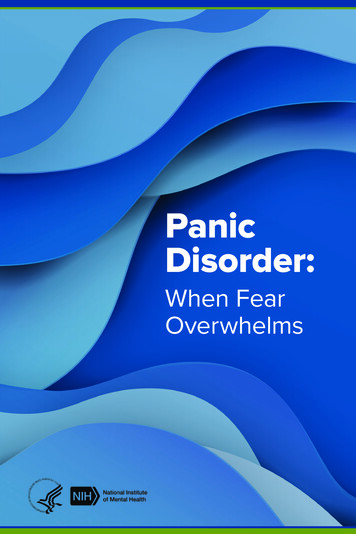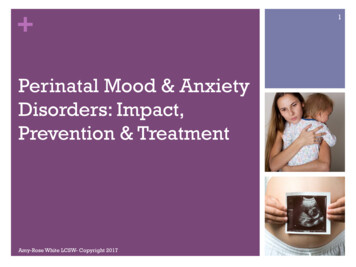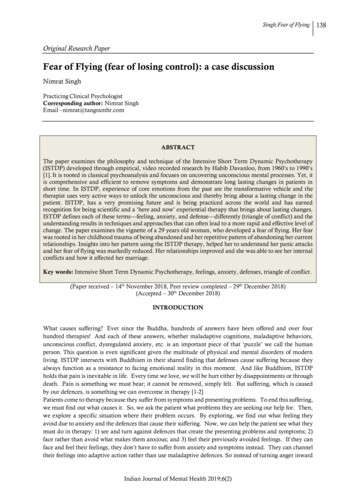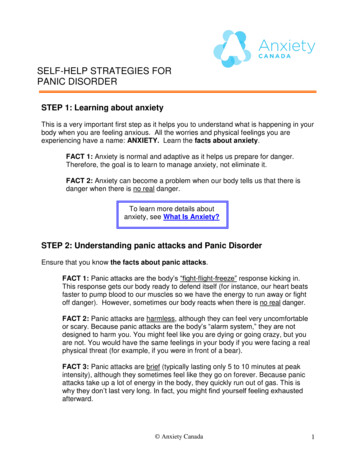
Transcription
PanicDisorder:When FearOverwhelms
Do you sometimes have sudden attacks of anxietyand overwhelming fear that last for several minutes?Maybe your heart pounds, you sweat, and you feellike you can’t breathe or think clearly. Do theseattacks occur at unpredictable times with noapparent trigger, causing you to worry about thepossibility of having another one at any time?An untreated panic disorder can affect your qualityof life and lead to difficulties at work or school. Thegood news is panic disorder is treatable. Learn moreabout the symptoms of panic disorder and how tofind help.What is panic disorder?People with panic disorder have frequent and unexpected panic attacks.These attacks are characterized by a sudden wave of fear or discomfort ora sense of losing control even when there is no clear danger or trigger.Not everyone who experiences a panic attack will develop panic disorder.Panic attacks often include physical symptoms that might feel like a heartattack, such as trembling, tingling, or rapid heart rate. Panic attacks canoccur at any time. Many people with panic disorder worry about thepossibility of having another attack and may significantly change their lifeto avoid having another attack. Panic attacks can occur as frequently asseveral times a day or as rarely as a few times a year.Panic disorder often begins in the late teens or early adulthood. Womenare more likely than men to develop panic disorder.
What are the signs and symptomsof panic disorder?People with panic disorder may have: Sudden and repeated panic attacks of overwhelming anxiety and fear A feeling of being out of control, or a fear of death or impending doomduring a panic attack An intense worry about when the next panic attack will happen A fear or avoidance of places where panic attacks have occurred in the past Physical symptoms during a panic attack, such as: Pounding or racing heartSweatingChillsTremblingDifficulty breathingWeakness or dizzinessTingly or numb handsChest painStomach pain or nauseaWhat causes panic disorder?Panic disorder sometimes runs in families, but no one knows for sure whysome family members have it while others don’t. Researchers have foundthat several parts of the brain and certain biological processes may play acrucial role in fear and anxiety. Some researchers think panic attacks arelike “false alarms” where our body’s typical survival instincts are activeeither too often, too strongly, or some combination of the two. For example,someone with panic disorder might feel their heart pounding and assumethey’re having a heart attack. This may lead to a vicious cycle, causing aperson to experience panic attacks seemingly out of the blue, the centralfeature of panic disorder. Researchers are studying how the brain andbody interact in people with panic disorder to create more specializedtreatments. In addition, researchers are looking at the ways stress andenvironmental factors play a role in the disorder.
How is panic disorder treated?If you’re experiencing symptoms of panic disorder, talk to a health careprovider. After discussing your history, a health care provider may conducta physical exam to ensure that an unrelated physical problem is notcausing your symptoms. A health care provider may refer you to a mentalhealth professional, such as a psychiatrist, psychologist, or clinical socialworker. The first step to effective treatment is to get a diagnosis, usuallyfrom a mental health professional.Panic disorder is generally treated with psychotherapy (sometimes called“talk therapy”), medication, or both. Speak with a health care providerabout the best treatment for you.PsychotherapyCognitive behavioral therapy (CBT), a research-supported type ofpsychotherapy, is commonly used to treat panic disorder. CBT teaches youdifferent ways of thinking, behaving, and reacting to the feelings thathappen during or before a panic attack. The attacks can become lessfrequent once you learn to react differently to the physical sensations ofanxiety and fear during a panic attack.Exposure therapy is a common CBT method that focuses on confrontingthe fears and beliefs associated with panic disorder to help you engage inactivities you have been avoiding. Exposure therapy is sometimes usedalong with relaxation exercises.For more information on psychotherapy, visit www.nimh.nih.gov/psychotherapies.MedicationHealth care providers may prescribe medication to treat panic disorder.Different types of medication can be effective, including: Antidepressants, such as selective serotonin reuptake inhibitors (SSRIs)and serotonin-norepinephrine reuptake inhibitors (SNRIs) Beta-blockers Anti-anxiety medications, such as benzodiazepines
SSRI and SNRI antidepressants are commonly used to treat depression,but they also can help treat the symptoms of panic disorder. They maytake several weeks to start working. These medications also may causeside effects, such as headaches, nausea, or difficulty sleeping. These sideeffects are usually not severe, especially if the dose starts off low and isincreased slowly over time. Talk to your health care provider about anyside effects that you may experience.Beta-blockers can help control some of the physical symptoms of panicdisorder, such as rapid heart rate, sweating, and tremors. Although healthcare providers do not commonly prescribe beta-blockers for panicdisorder, the medication may be helpful in certain situations that precedea panic attack.Benzodiazepines, which are anti-anxiety sedative medications, can bevery effective in rapidly decreasing panic attack symptoms. However,some people build up a tolerance to these medications and need higherand higher doses to get the same effect. Some people even becomedependent on them. Therefore, a health care provider may prescribe themonly for brief periods of time if you need them.Both psychotherapy and medication can take some time to work. Manypeople try more than one medication before finding the best one for them.A health care provider can work with you to find the best medication,dose, and duration of treatment for you. A healthy lifestyle also can helpcombat panic disorder. Make sure to get enough sleep and exercise, eata healthy diet, and turn to family and friends who you trust for support. Tolearn more ways to take care of your mental health, visit www.nimh.nih.gov/mymentalhealth.For more information about medications used to treat panic disorder, visitwww.nimh.nih.gov/medications. Visit the Food and Drug Administration’swebsite (www.fda.gov/drugsatfda) for the latest warnings, patientmedication guides, and information on newly approved medications.
How can I support myself and otherswith panic disorder?Educate YourselfA good way to help yourself or a loved one who may be struggling withpanic attacks or panic disorder is to seek information. Research thewarning signs, learn about treatment options, and keep up to date withcurrent research.CommunicateIf you are experiencing panic disorder symptoms, have an honestconversation about how you’re feeling with someone you trust. If you thinkthat a friend or family member may be struggling with panic disorder, setaside a time to talk with them to express your concern and reassure themof your support.Know When to Seek HelpIf your anxiety, or the anxiety of a loved one, starts to cause problems ineveryday life—such as at school, at work, or with friends and family—it’stime to seek professional help. Talk to a health care provider about yourmental health.Are there clinical trials studying panic disorder?NIMH supports a wide range of research, including clinical trials that lookat new ways to prevent, detect, or treat diseases and conditions—including panic disorder. Although individuals may benefit from being partof a clinical trial, participants should be aware that the primary purpose ofa clinical trial is to gain new scientific knowledge so that others may bebetter helped in the future.Researchers at NIMH and around the country conduct clinical trials withpatients and healthy volunteers. Talk to a health care provider aboutclinical trials, their benefits and risks, and whether one is right for you.For more information, visit www.nimh.nih.gov/clinicaltrials.
Finding HelpBehavioral Health Treatment Services LocatorThis online resource, provided by the Substance Abuse and Mental HealthServices Administration, helps you locate mental health treatment facilitiesand programs. Find a facility in your state at https://findtreatment.samhsa.gov. For additional resources, visit www.nimh.nih.gov/findhelp.Talking to a Health Care Provider About Your Mental HealthCommunicating well with a health care provider can improve your care andhelp you both make good choices about your health. Find tips to help preparefor and get the most out of your visit at www.nimh.nih.gov/talkingtips. Foradditional resources, including questions to ask a provider, visit the Agencyfor Healthcare Research and Quality website at www.ahrq.gov/questions.If you or someone you know is in immediate distress or is thinking abouthurting themselves, call the National Suicide Prevention Lifelinetoll-free at 1-800-273-TALK (8255). You also can text the Crisis TextLine (HELLO to 741741) or use the Lifeline Chat on the National SuicidePrevention Lifeline website at https://suicidepreventionlifeline.org.
ReprintsThis publication is in the public domain and may be reproduced or copiedwithout permission from NIMH. Citation of NIMH as a source is appreciated.To learn more about using NIMH publications, please contact the NIMHInformation Resource Center at 1-866-615-6464, email nimhinfo@nih.gov,or refer to NIMH’s reprint guidelines at www.nimh.nih.gov/reprints.For More InformationNIMH websitewww.nimh.nih.govwww.nimh.nih.gov/espanol (en español)Medline Plus (National Library of s.gov/spanish (en ttp://salud.nih.gov/investigacion-clinica (en español)National Institute of Mental HealthOffice of Science Policy, Planning, and Communications6001 Executive BoulevardRoom 6200, MSC 9663Bethesda, MD 20892-9663Toll-free: 1-866-615-6464Email: nimhinfo@nih.govWebsite: www.nimh.nih.govU.S. DEPARTMENT OF HEALTH AND HUMAN SERVICESNational Institutes of HealthNIH Publication No. 22-MH-8077Revised 2022
An untreated panic disorder can affect your quality of life and lead to difficulties at work or school. The good news is panic disorder is treatable. Learn more about the symptoms of panic disorder and how to find help. What is panic disorder? People with panic disorder have frequent and unexpected panic attacks.










